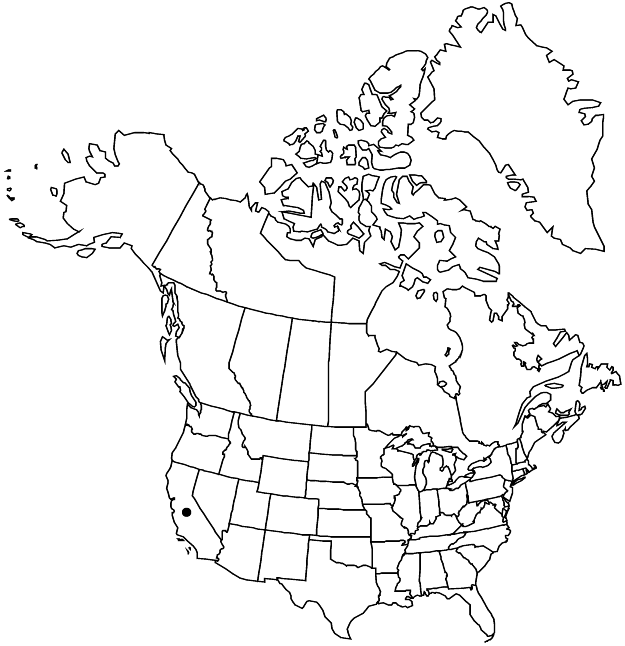familyEricaceae
subfamilyEricaceae subfam. Arbutoideae
genusArctostaphylos
speciesArctostaphylos montana
subspeciesArctostaphylos montana subsp. ravenii
Difference between revisions of "Arctostaphylos montana subsp. ravenii"
Madroño 54: 150. 2007,.
Common names: Presidio manzanita
Basionym: Arctostaphylos hookeri subsp. ravenii P. V. Wells Madroño 19: 200. 1968
FNA>Volume Importer |
imported>Volume Importer |
||
| (6 intermediate revisions by 2 users not shown) | |||
| Line 7: | Line 7: | ||
}} | }} | ||
|common_names=Presidio manzanita | |common_names=Presidio manzanita | ||
| − | |basionyms={{Treatment/ID/ | + | |basionyms={{Treatment/ID/Basionym |
|name=Arctostaphylos hookeri subsp. ravenii | |name=Arctostaphylos hookeri subsp. ravenii | ||
|authority=P. V. Wells | |authority=P. V. Wells | ||
| + | |rank=subspecies | ||
| + | |publication_title=Madroño | ||
| + | |publication_place=19: 200. 1968 | ||
}} | }} | ||
|synonyms= | |synonyms= | ||
| Line 27: | Line 30: | ||
|distribution=Calif. | |distribution=Calif. | ||
|discussion=<p>Of conservation concern.</p><!-- | |discussion=<p>Of conservation concern.</p><!-- | ||
| − | --><p>Subspecies ravenii occurs near the coast in San Francisco County. The relationship of this taxon is problematic; only one living individual is known from the wild. It is in the Center for Plant Conservation’s National Collection of Endangered Plants as Arctostaphylos hookeri subsp. ravenii.</p> | + | --><p>Subspecies ravenii occurs near the coast in San Francisco County. The relationship of this taxon is problematic; only one living individual is known from the wild. It is in the Center for Plant Conservation’s National Collection of Endangered Plants as <i>Arctostaphylos hookeri</i> <i></i>subsp.<i> ravenii</i>.</p> |
|tables= | |tables= | ||
|references= | |references= | ||
| Line 36: | Line 39: | ||
-->{{#Taxon: | -->{{#Taxon: | ||
name=Arctostaphylos montana subsp. ravenii | name=Arctostaphylos montana subsp. ravenii | ||
| − | |||
|authority=(P. V. Wells) V. T. Parker | |authority=(P. V. Wells) V. T. Parker | ||
|rank=subspecies | |rank=subspecies | ||
| Line 51: | Line 53: | ||
|publication year= | |publication year= | ||
|special status= | |special status= | ||
| − | |source xml=https:// | + | |source xml=https://bitbucket.org/aafc-mbb/fna-data-curation/src/2e0870ddd59836b60bcf96646a41e87ea5a5943a/coarse_grained_fna_xml/V8/V8_846.xml |
|subfamily=Ericaceae subfam. Arbutoideae | |subfamily=Ericaceae subfam. Arbutoideae | ||
|genus=Arctostaphylos | |genus=Arctostaphylos | ||
Latest revision as of 23:46, 5 November 2020
Shrubs prostrate, 0.1–0.5 m; young twigs gray-tomentose. Leaf blades orbiculate-elliptic, 1–2.2 × 1–1.5 cm. Fruits 4–5 mm diam. 2n = 52.
Phenology: Flowering early–late spring.
Habitat: Maritime chaparral, coastal prairie on serpentine soils
Elevation: 0-100 m
Discussion
Of conservation concern.
Subspecies ravenii occurs near the coast in San Francisco County. The relationship of this taxon is problematic; only one living individual is known from the wild. It is in the Center for Plant Conservation’s National Collection of Endangered Plants as Arctostaphylos hookeri subsp. ravenii.
Selected References
None.
Lower Taxa
None.
